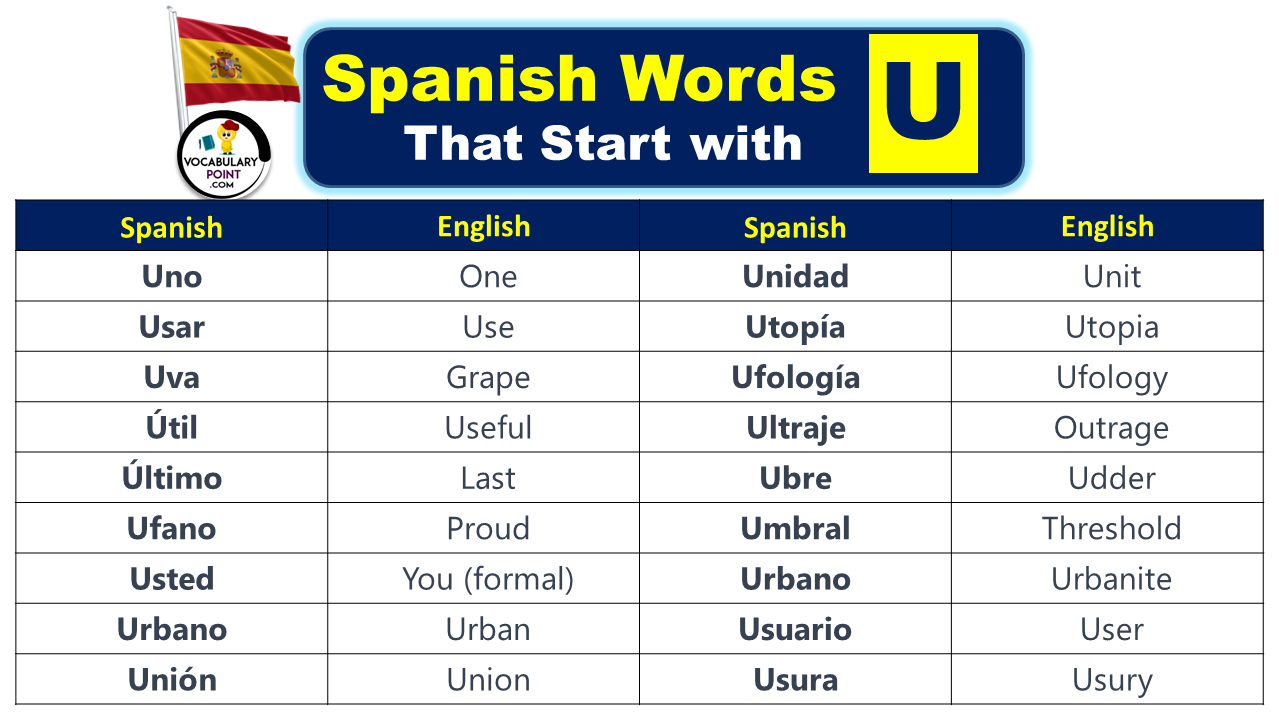Let’s face it: sometimes, you just need the right word to spice up your Spanish conversation. Maybe you’re writing a poem, crafting a song, or just looking for a way to impress your friends with your knowledge of the language. No matter the reason, we all need a little help sometimes! Today, we’re taking a trip through the Spanish alphabet, focusing on words that start with the letter “U.”

Image: infoaway.com
You might be surprised to discover how many words and phrases start with this vowel. From common words you use daily to obscure vocabulary, the letter “U” is used in many different contexts. You’ll be surprised at how quickly you can expand your knowledge and fluency. Buckle up, amigos, because we’re diving into the wide world of Spanish words that start with “U.”
The Uniqueness of “U”
The letter “U” holds a fascinating place in the Spanish language. Unlike English, where “U” often creates a “yew” sound, Spanish “U” consistently holds the “oo” sound, similar to the English word “moon.”
This consistency makes Spanish pronunciation relatively straightforward when it comes to “U.” However, as in English, the letter “U” may also be found in a dipthong – a combination of two vowels making a singular sound. These are most commonly found with the letter “i” (ui) or “e” (ue) such as in “cuidado” (care) and “sueño” (dream).
Common Spanish Words with “U”
Let’s start with the basics. Here are some common words you might encounter in your Spanish travels:
- Una (one, a, an): This is an extremely common word, used in countless expressions and scenarios.
- Usted (you formal): This is the formal way to address one person, making it crucial in more formal settings.
- Un (one, a, an masculine): This is the masculine version of “una,” used for masculine nouns.
- Usar (to use): One of the most versatile verbs in Spanish, it’s essential for everyday conversations.
- Uy (oh my gosh, ouch): This expresses a sudden surprise, pain, or shock.
These are just a few examples, but you’ll discover many more in daily conversation!
From Everyday Speak to Unique Vocab
As you delve deeper into the Spanish lexicon, you’ll find words of varying degrees of complexity. You might find these words helpful in specific contexts:
| Word | English Translation | Example Sentence |
|---|---|---|
| Uniforme | Uniform | El uniforme escolar es obligatorio. (The school uniform is mandatory.) |
| Ultra | Extremely, ultra | Su velocidad era ultra rápida. (His speed was extremely fast.) |
| Único | Unique | Este restaurante ofrece una experiencia única. (This restaurant offers a unique experience.) |
| Umbrella | Umbrella | Llevo un umbrella por si llueve. (I’m bringing an umbrella in case it rains.) |
| Ubiquidad | Ubiquity | La ubicuidad de la tecnología moderna es asombrosa. (The ubiquity of modern technology is amazing.) |
These are just a few examples, but you’ll discover many more in daily conversation!

Image: vocabularypoint.com
Expanding Your Spanish Vocabulary
Now that you’ve had a taste of vocabulary, here are some tips to enhance your knowledge of Spanish words that start with “U” and expand your overall fluency in the language:
1. Immerse Yourself in Spanish Media:
One of the best ways to learn a language is to immerse yourself in it. This can include watching Spanish movies and TV shows, reading Spanish books, listening to Spanish music, and even engaging in online Spanish communities.
2. Engage in Conversations:
The more you practice speaking Spanish, the more natural it will become. Find a language exchange partner or join a conversation group. Even casual conversations with native speakers can be incredibly beneficial.
3. Utilize Spanish Language Resources:
There are many apps, websites, and dictionaries that can help you learn new vocabulary. Look for resources specifically designed for beginners as this can be especially helpful.
4. Challenge Yourself with Games:
Make learning fun! There are many online games or apps (like Scrabble or crosswords) that can help you practice your vocabulary in a fun and engaging way.
5. Seek Out Native Speakers’ Advice:
If you know a Spanish speaker, don’t hesitate to ask them for their recommendations. They can provide insights about slang, idioms, and everyday expressions that you might not find in a textbook!
Frequently Asked Questions
Here are some common questions that people have about Spanish words that start with “U”:
Q: Why are there so many Spanish words that start with “U?”
A: While it might seem like there are many words starting with “U,” it’s actually a matter of how often certain words are used. The frequency of use creates a perception of abundance!
Q: Are there any Spanish words starting with “U” that are especially difficult to pronounce?
A: While “U” is generally consistent in its pronunciation, the dipthongs (ui, ue) can be tricky for English speakers accustomed to “u” making a “yew” sound.
Q: Is there a resource that lists all Spanish words starting with “U?”
A: A definitive list would be challenging to create with the ever-evolving Spanish language. However, you can explore online Spanish dictionaries or language resources for extensive vocabulary databases.
Spanish Words That Start With U
A Final Thought
Learning Spanish is a journey of exploration and discovery, and words starting with “U” are just a small part of the vibrant language that awaits. Remember: Be curious, be creative, and most importantly, have fun!
Are you ready to explore more vocabulary that starts with “U” or other letters in the Spanish alphabet? Tell us in the comments below!






